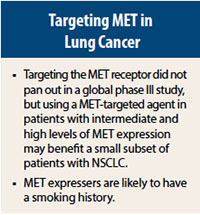Two different abstracts explored the potential for MET as a therapeutic target in patients with metastatic non–small cell lung cancer (NSCLC), with different results. A phase III study found that onartuzumab, an antibody that targets the MET receptor, combined with erlotinib (Tarceva) was not as effective as erlotinib alone for the treatment of metastatic NSCLC. However, analysis of a phase I study suggests that crizotinib (Xalkori) may be a worthy strategy to pursue in smokers with MET-amplified metastatic NSCLC.
The MET pathway is a target of interest in NSCLC for the following reasons: Dysregulation of the MET pathway is associated with a worse prognosis in NSCLC and other solid tumors. In NSCLC, a high MET copy number is associated with shorter survival and higher risk of death after resection, explained lead author of the global phase III METLung trial, David R. Spigel, MD, an oncologist at Sarah Cannon Cancer Center, Nashville.1
Additionally, MET and epidermal growth factor receptor (EGFR) are often coexpressed and coactivated in NSCLC. MET amplification occurs in lung cancers with acquired resistance to EGFR tyrosine kinase inhibitors. Dr. Spigel continued.
METLung Trial
On the heels of a positive phase II trial suggesting that onartuzumab would be more effective in patients selected for MET expression, the METLung trial was undertaken to study the effect of onartuzumab combined with erlotinib (an EGFR tyrosine kinase inhibitor) vs erlotinib alone in previously treated stage IIIB or IV NSCLC. The study was supported by Genentech and Roche.
METLung was stopped early because the futility boundary was crossed, and onartuzumab added to erlotinib was shown to be not superior to erlotinib alone in patients selected for high MET expression.
“The results of this global phase III trial involving 27 countries turned out to be negative. They did not confirm the phase II findings in the MET-positive population, and the lack of benefit for the addition of onartuzumab was consistent across subgroups,” Dr. Spigel said. “Onartuzumab did not provide a benefit to the EGFR-positive patients either,” he added.
METLung included patients with centrally confirmed high MET expression with good performance status. EGFR mutation status was analyzed at the same time as MET. Between 2012 and 2013, 499 patients were randomly assigned 1:1 to erlotinib plus onartuzumab or erlotinib plus placebo and treated until disease progression. Median follow-up was 7.7 months.
Patients enrolled in the phase III trial had demographics “identical” to those in the pivotal phase II trial, he said. Most patients had nonsquamous histology. About two-thirds were in second-line therapy and one-third had received at least two prior therapies. In each arm, 11% had EGFR-mutated tumors. Most of the patients had high MET expression in at least 50% of cells, he added.
Median overall survival was 6.8 months for erlotinib plus onartuzumab vs 9.1 months for erlotinib. An intent-to-treat analysis of progression-free survival showed almost identical curves for the two regimens: 2.6 months for erlotinib alone vs 2.7 months for the combination. No subgroup stood out as having preferential benefit from the combination for either overall or progression-free survival.
The combination was well tolerated, with rash and diarrhea being the most frequently reported adverse events in both arms. Adverse events reported more frequently with the combination included peripheral edema and hypoalbuminemia.
Crizotinib Study
“The MET gene is amplified in up to 7% of all NSCLC, where it may be functioning as a primary oncogenic driver. Amplification is a continuous variable though, and the relevant cutpoint for defining ‘presence’ may be different from that defining its predictive role for identifying benefit from MET inhibition,” noted D. Ross Camidge, MD, Director of the Thoracic Oncology Clinical Program at the University of Colorado School of Medicine, Denver, who presented the first results of crizotinib treatment in MET-amplified NSCLC from the original phase I study of crizotinib.2 MET amplification has also been described as a secondary event in EGFR mutant patients resistant to EGFR tyrosine kinase inhibitors, but this is a different medical scenario from its role as a primary driver, he added.
Patients with NSCLC entered in the trial were stratified according to three levels of MET amplification (as determined by MET/CEP7 ratio) on fluorescence in situ hybridization (FISH) testing (low, intermediate, and high) in this phase I study. Notably, these patients were not selected by EGFR status, nor was an EGFR inhibitor involved in the trial.
At the time of the ASCO Annual Meeting, 14 patients were accrued to the NSCLC cohort (2 categorized as low-MET, 6 intermediate-MET, and 6 high-MET), mostly patients with adenocarcinoma. Overall duration of treatment was longer in those with higher levels of MET expression. Interestingly, 86% of those with MET amplification (any level) had a history of smoking in this study.
Treatment-related adverse events were similar in the three groups according to MET amplification. Results suggested improved efficacy as the MET amplification ratio increased: in the intermediate-MET group, four patients had stable disease and one had a partial response, and in the high-MET group, three had a partial response and one had a complete response. Objective partial response rates were 0%, 17%, and 67% in the low-, intermediate-, and high-MET groups, respectively. “These responses [in the intermediate- and high-MET groups] were persistent,” Dr. Camidge said.
“Our results suggest that MET-amplified disease may represent a novel targetable subtype of NSCLC, notably present among those with smoking activity,” he concluded. “These findings warrant further study of crizotinib in MET-amplified advanced NSCLC.” The optimal methods, optimal biomarker, and meaningful thresholds of MET expression remain to be defined, he added. ■
Disclosure: Dr. Spigel is a consultant or advisor for Genentech. Dr. Camidge is a consultant or advisor for and has received research funding from Pfizer.
References
1. Spigel DR, Edelman MJ, O’Byrne K, et al: Onartuzumab plus erlotinib versus erlotinib in previously treated stage IIIb or IV NSCLC: Results from the pivotal phase III randomized, multicenter, placebo-controlled METLung (OAM4971g) global trial. ASCO Annual Meeting. Abstract 8000. Presented June 2, 2014.
2. Camidge DR, Ou SI, Shapiro G, et al: Efficacy and safety of crizotinib in patients with advanced C-MET amplified non-small cell lung cancer (NSCLC). ASCO Annual Meeting. Abstract 8001. Presented June 2, 2014.




